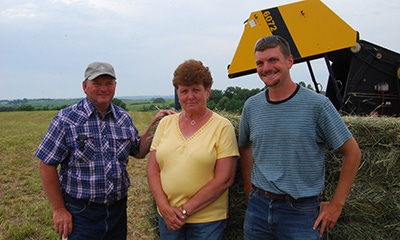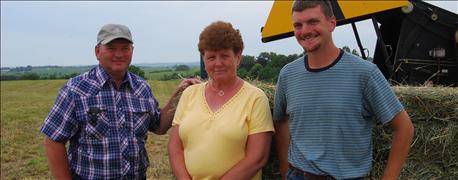October 13, 2016

FAQ: I graduated from college and have been working in a major city for five years in a job related to my accounting degree. I was raised on a small family farm and want to move back to the farm which is still owned by my family. The farm will become available next year, as my uncle who is now farming it is retiring. What programs, help and advice for beginning farmers does USDA offer?
Answer: John Whitaker, state executive director of USDA’s Farm Service Agency (FSA) in Iowa, provides insight in answering that question. He discusses how people who are interested in starting an agricultural enterprise can make the endeavor a reality.

GOOD ADVICE: “Being a farmer or livestock producer is not just a job change, it’s a life change. You need to know where you’re headed and how you’ll get there. USDA is committed to helping you reach your goals,” says FSA’s John Whitaker.
“During the recent 2016 Farm Progress Show at Boone, I was frequently asked how someone who is interested in agriculture can get started.” says Whitaker. “Since the average age of the American farmer is now 56, it’s exciting to know that many people with an entrepreneurial spirit are focusing their attention on agriculture.” Here are some of the specific questions Whitaker received while he was present in the USDA/FSA exhibit at the Farm Progress Show. He provides the following answers.
Question: As a prospective new farmer, what are some of the “next steps,” I should consider?
Answer: Always contemplate USDA’s 4Ps for new farmers.
Purpose: Why do you want to become a farmer?
Plan: You may have the drive to start a farm, but do you have a comprehensive business plan?
Product: What are you going to commit your time and money to producing?
People: Who comprises your business team and your community?
It’s no secret that making a living in production agriculture is very rewarding but it’s also no secret that it’s labor and capital intensive and weather and market dependent. However, as they say, “nothing worth having comes easy.” USDA reminds new producers that being a farmer or livestock producer is not just a job change, it’s a life change. You need to know where you’re headed and how you’ll get there. USDA is committed to helping you reach your goals.
Question: What type of federal farm program support does USDA’s Farm Service Agency provide to farmers?
Answer: Since the 1930s, FSA has provided invaluable support to America’s agricultural producers. Today, FSA’s responsibilities are organized into five mission areas: Farm Programs, Farm Loans, Commodity Operations, Management and State Operations. Below are the two primary mission areas administered through FSA’s extensive network of county offices.
Farm Programs – FSA farm programs include commodity and price support, conservation and disaster assistance programs.
Farm Loan Programs – FSA offers an extensive portfolio of ownership and operating loans for agricultural producers who are unable to receive private, commercial credit. FSA places special emphasis on providing loans to beginning, veterans, minority and women applicants.
On average, FSA administers more than 50 federal farm programs. There is literally something of interest to everyone regardless of the size or type of a particular agricultural operation. Whether you have a row crop, livestock, organic, diversified, niche market, small or large operation, there are FSA programs for which you may qualify.
Question: I have not previously participated in any FSA programs and would like to learn more about these programs. What do I need to do to get started?
Answer: The first step is to make an appointment with your local FSA office. FSA’s personnel will explain valuable programs and benefits that could be available to you. If you decide to voluntarily enroll your farm in the USDA database, FSA will assist you in locating your farm on the aerial photography and will assign you a farm number which will be used to manage future program participation.
When you visit FSA for the first time, it will be helpful for you to bring the following information in order to expedite your enrollment and begin learning about available benefits:
Proof of identity – You will be required to show a valid state driver’s license, passport or other form of personal identification as well as provide your Social Security card or IRS paperwork that verifies an Employer Identification Number (EIN). Original documents are required for verification and photocopying.
Proof of ownership - Copy of the recorded deed or rental agreement as evidence of land ownership or control if applicable.
Entity identification and status - Copy of the articles of corporation; trust and estate documents; or partnership agreements if applicable.
Financial and productions records - If you apply for a farm ownership or operating loan from FSA, financial and production records must be furnished.
It takes time to process the paperwork and additional information may be needed for commodity, disaster and conservation program applications so preplanning is encouraged.
Note on confidential and private information: Many of the program application forms or documentation require that the applicant provide sensitive contact, financial or other confidential information. Disclosure of this data is voluntary, but failure to provide the required information may result in the deferral of your application or denial of a benefit payment. By law, ‘confidential, private and sensitive information’ is protected by USDA. USDA employees and partners are subject to penalty and disciplinary action for inappropriate or mismanagement of private data.
Question: How can I learn more about the programs offered by FSA and stay informed about future programs offered that may be applicable to my production agriculture operation or farming and ranching goals?
Answer: Make a point to visit one of our local USDA Service centers to ask our extremely knowledgeable staff for assistance or suggestions regarding programs that might meet needs specific to your operation.
From preparing a business plan, to managing risk and from securing capital to obtaining needed education and trading, FSA is with you every step of the way.
To find your nearest FSA office, visit offices.usda.gov. Additional information on USDA and FSA new and beginning farmer programs can be found at newfarmers.usda.gov/. To subscribe to FSA’s monthly newsletters for a particular county or program, visit fsa.usda.gov/subscribe.
You May Also Like




